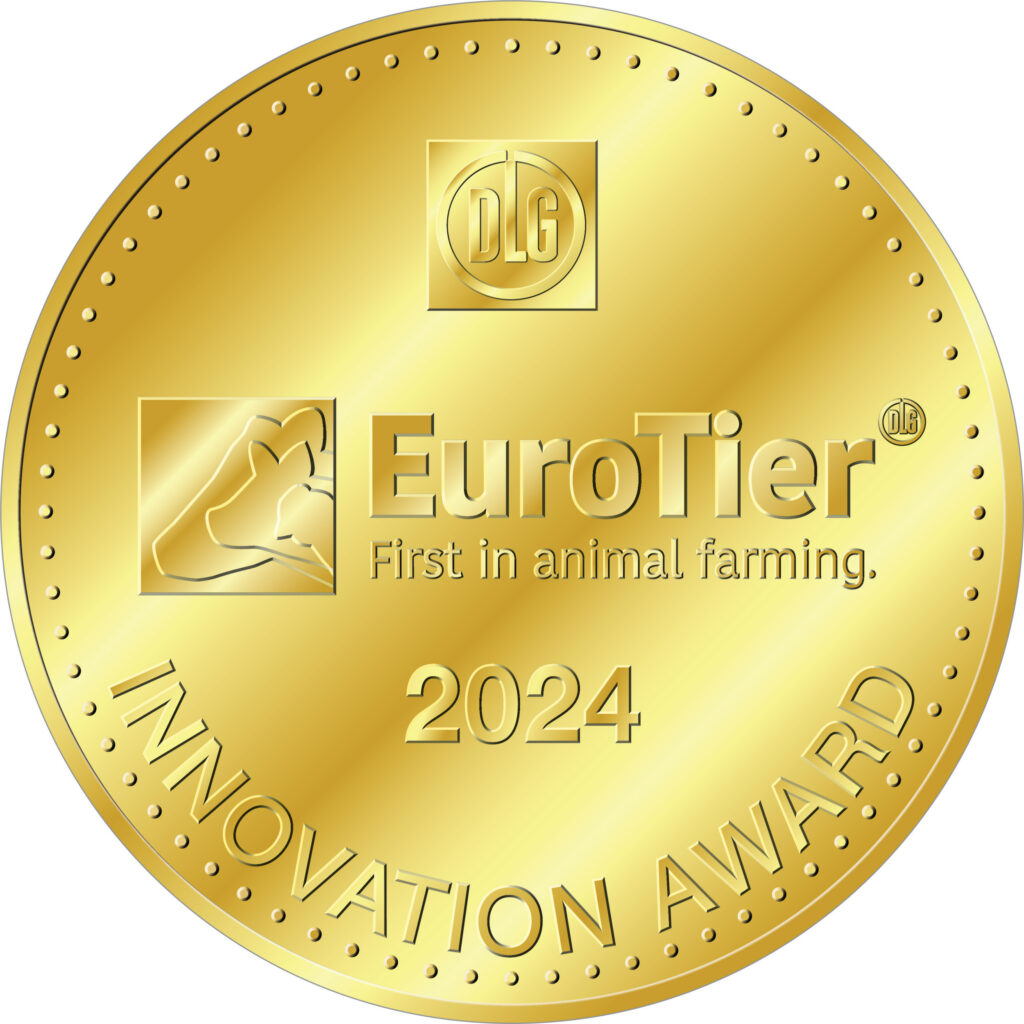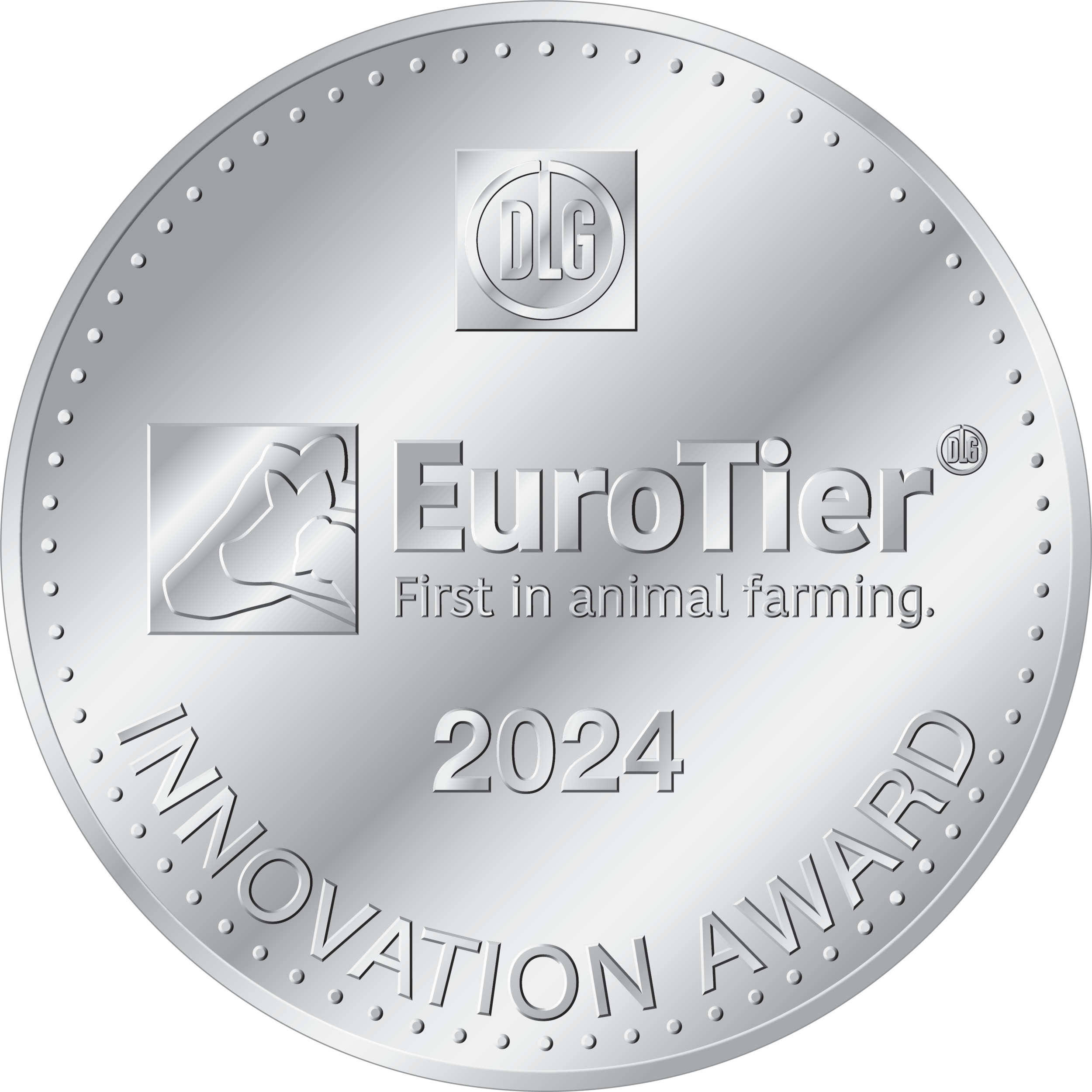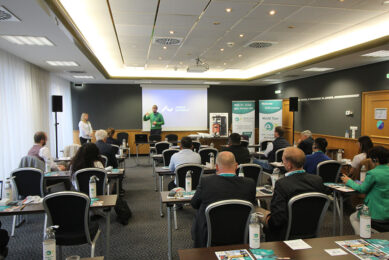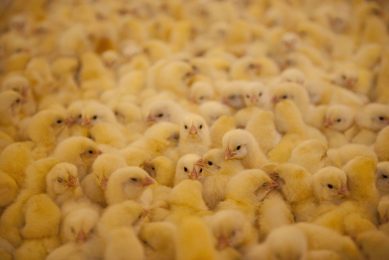Poultry industry rakes up EuroTier medals

At the 2024 edition of EuroTier, 2 poultry industry innovations received a gold medal. No fewer than 7 innovations were awarded a silver medal. With 9 out of a total of 25 medals awarded to the livestock industry, the poultry industry showed its most innovative side.
The 2024 edition of EuroTier will be held in Hanover, Germany, from 12-15 November. At a press conference in Offenbach, Germany, the organising German Agricultural Society (DLG) said that the show will feature over 2,000 exhibitors from 52 countries. In total, 665 exhibitors will be from Germany (35%), whereas the other 1,389 exhibitors (65%) come from outside the host nation. The show, which will be held on 22 hectares of showground, expects to welcome around 120,000 visitors from the international agricultural community.
In total, 255 innovations were submitted to the EuroTier jury. Prof Heinz Bernhardt of the EuroTier Innovation Commission pointed out various trends, including AI in animal farming, animal welfare, robotics, emission reduction and barn climate improvement.
The following poultry innovations won a medal…
 Red mite trap
Red mite trap
MIK International
Hall 15, Stand D26
 Together with the renowned Friedrich-Loeffler-Institut, German firm MIK International developed the cold plasma mite trap. This technical system for residue-free control of the red poultry mite has the potential to replace the chemical control methods used so far. The new cold plasma mite trap combats the mites by means of a mite trap. In this, the mites are exposed to a cold atmospheric pressure plasma, which is generated by dielectric barrier discharge in a chamber located between a positively chargeable electrode covered by a dielectric and an earthed electrode. The mite traps are attached beneath the perches and are equipped with an automatic cleaning system that pushes the dead mites out of the trap.
Together with the renowned Friedrich-Loeffler-Institut, German firm MIK International developed the cold plasma mite trap. This technical system for residue-free control of the red poultry mite has the potential to replace the chemical control methods used so far. The new cold plasma mite trap combats the mites by means of a mite trap. In this, the mites are exposed to a cold atmospheric pressure plasma, which is generated by dielectric barrier discharge in a chamber located between a positively chargeable electrode covered by a dielectric and an earthed electrode. The mite traps are attached beneath the perches and are equipped with an automatic cleaning system that pushes the dead mites out of the trap. Automated vaccination robot
Automated vaccination robot
Agri Advanced Technologies
Hall 17, Stand B20
 Improving vaccination quality and reducing stress for the birds are the main advantages of Agri Advanced Technologies’ new Vaccybot. This fully automatic vaccination robot for poultry farming has the potential to replace manual vaccination with needles, which has been the standard procedure to date and is prone to errors. The procedure means less stress for the animals with a higher vaccination quality combined with improved animal health, and equates to a genuine reduction of the livestock owner’s workload. The system enables the simultaneous injection of up to 6 different vaccines with previously unequalled precision and speed.
Improving vaccination quality and reducing stress for the birds are the main advantages of Agri Advanced Technologies’ new Vaccybot. This fully automatic vaccination robot for poultry farming has the potential to replace manual vaccination with needles, which has been the standard procedure to date and is prone to errors. The procedure means less stress for the animals with a higher vaccination quality combined with improved animal health, and equates to a genuine reduction of the livestock owner’s workload. The system enables the simultaneous injection of up to 6 different vaccines with previously unequalled precision and speed. Exoskeleton for high pressure cleaning
Aufratech
Hall 24, A23
 In order to reduce physical discomfort, French company Aufratech developed an exoskeleton for high-pressure cleaning work: the Exon Dual and the Exon Mini. A lightweight, adjustable and comfortable tubular chassis and corresponding harnesses result in advantages in distributing the weight of the lance over the shoulders, as the reaction forces of the cleaning lance are transferred to the torso. It is also possible to attach the supply hose in the waist area. A 2-hand control module, which is positioned in front of the user, also results in a low trigger force.
In order to reduce physical discomfort, French company Aufratech developed an exoskeleton for high-pressure cleaning work: the Exon Dual and the Exon Mini. A lightweight, adjustable and comfortable tubular chassis and corresponding harnesses result in advantages in distributing the weight of the lance over the shoulders, as the reaction forces of the cleaning lance are transferred to the torso. It is also possible to attach the supply hose in the waist area. A 2-hand control module, which is positioned in front of the user, also results in a low trigger force. Electron beam hatching egg sterilisation
Agri Advanced Technologies
Hall 12, stand B20
 The eggytizer from German manufacturer Agri Advanced Technologies uses electron beam sterilisation technology to disinfect hatching eggs, as a result of which disinfection performance is increased and the use of chemical agents is reduced. This form of sterilisation with accelerated electrons enables deeper penetration into the eggshell than conventional treatments involving UV or ozone and guarantees improved disinfection performance, improved animal health and economic benefits. Better hatching results have also been achieved in initial tests.
The eggytizer from German manufacturer Agri Advanced Technologies uses electron beam sterilisation technology to disinfect hatching eggs, as a result of which disinfection performance is increased and the use of chemical agents is reduced. This form of sterilisation with accelerated electrons enables deeper penetration into the eggshell than conventional treatments involving UV or ozone and guarantees improved disinfection performance, improved animal health and economic benefits. Better hatching results have also been achieved in initial tests.Bale twine remover
Betebe
Hall 12, Stand F26
 Used in multiple animal husbandry systems, from deep litter cow barns to duck houses, automatic straw dispensing systems had one issue. Bale strapping and baler twine had to be manually removed from a straw bale after opening before it could be fed into the straw distribution system. Thanks to automatic baler twine removal, the Betebe straw express saves time and ensures greater working time flexibility and improved work quality in cubicle, sloping floor or deep litter sheds thanks to a bale magazine for up to twelve square bales.
Used in multiple animal husbandry systems, from deep litter cow barns to duck houses, automatic straw dispensing systems had one issue. Bale strapping and baler twine had to be manually removed from a straw bale after opening before it could be fed into the straw distribution system. Thanks to automatic baler twine removal, the Betebe straw express saves time and ensures greater working time flexibility and improved work quality in cubicle, sloping floor or deep litter sheds thanks to a bale magazine for up to twelve square bales. Cleaning robot for aviary systems
Big Dutchman
Hall 17, stand D20
 Washing aviary sheds in laying hen farming poses a challenge on various levels due to complex angular systems. In the manual cleaning method used so far, some areas are difficult to reach, leading to a high workload and cleaning results that are not always satisfactory. The Sharky430 washing robot from Big Dutchman enables fully automatic cleaning of aviary systems in rearing and laying hen barns, even in places that are difficult to access during manual cleaning.
Washing aviary sheds in laying hen farming poses a challenge on various levels due to complex angular systems. In the manual cleaning method used so far, some areas are difficult to reach, leading to a high workload and cleaning results that are not always satisfactory. The Sharky430 washing robot from Big Dutchman enables fully automatic cleaning of aviary systems in rearing and laying hen barns, even in places that are difficult to access during manual cleaning.Semi-automation vaccination
Big Dutchman
Hall 17, stand D20
 The semi-automatic MultiVacc vaccination machine from German manufacturer Big Dutchman can simultaneously administer four breast vaccinations and one wing vaccination to an animal held against it in an animal-friendly manner, thus resulting in improved vaccination safety while simultaneously reducing stress. Vaccination, which has so far usually been carried out manually by means of intramuscular injection using hypodermic needles, subjects the animals to considerable stress. In addition, MultiVacc prevents the risk of pathogen transmission or broken needles in the animals (and subsequently in the meat), which can cause the animals pain.
The semi-automatic MultiVacc vaccination machine from German manufacturer Big Dutchman can simultaneously administer four breast vaccinations and one wing vaccination to an animal held against it in an animal-friendly manner, thus resulting in improved vaccination safety while simultaneously reducing stress. Vaccination, which has so far usually been carried out manually by means of intramuscular injection using hypodermic needles, subjects the animals to considerable stress. In addition, MultiVacc prevents the risk of pathogen transmission or broken needles in the animals (and subsequently in the meat), which can cause the animals pain.Sex determination
Omegga
Hall 17, stand H18
The OmeggaOne system recognises the embryo’s sex in the egg significantly earlier than before and without the need for interventions into the egg, which could affect the chicks’ embryonic development. Omegga has significantly improved the technology for determining the sex of laying hen chicks in the egg (‘in ovo’) by using non-invasive and cost-efficient, AI-aided spectroscopy. The newly developed system recognises the sex up to the seventh day of incubation. No chemical or physical intervention into the egg is required and the embryonic development of the chicks is therefore not affected.
Holistic system for rodent control
MS Schippers
Hall 11, A11
 HyCare Digital from MS Schippers in the Netherlands is a holistic system for rodent control on farms without the use of rodenticides. This system combines natural methods of rodent deterrence, such as the colonisation of predators and habitat management, with digital surveillance and trap systems. The individual surveillance points and traps can be monitored via an app. The app reports corresponding observations directly to the producer’s smartphone so that he/she can respond. The triggering of traps is also reported so that they can be quickly checked and reactivated and the control measures are documented.
HyCare Digital from MS Schippers in the Netherlands is a holistic system for rodent control on farms without the use of rodenticides. This system combines natural methods of rodent deterrence, such as the colonisation of predators and habitat management, with digital surveillance and trap systems. The individual surveillance points and traps can be monitored via an app. The app reports corresponding observations directly to the producer’s smartphone so that he/she can respond. The triggering of traps is also reported so that they can be quickly checked and reactivated and the control measures are documented.














